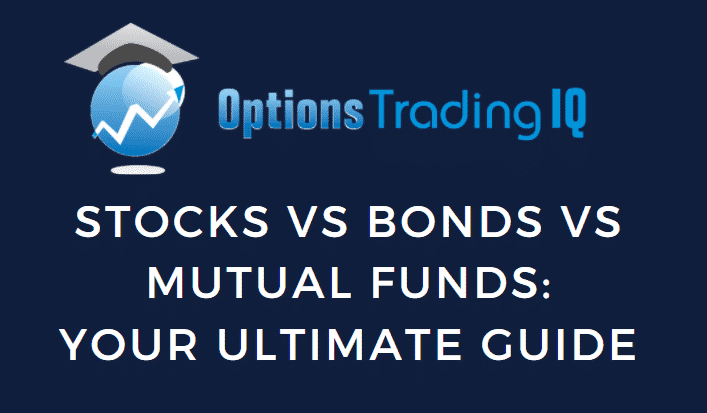

Three of the most popular investment opportunities happen to be stocks, bonds, and mutual funds. Lets take a look at stocks vs bonds vs mutual funds.
Contents
- Ultimate Guide to the Stock Market
- Ultimate Guide to Bonds
- Ultimate Guide to Mutual Funds
- Final Thoughts
This guide will teach you about each of these important types of investments and describe some of the reasons that each one might be useful to you as an investor.
Are you curious about all of the different ways you can invest your money?
If so, then you’ve come to the right place today because we will discuss the main differences between stocks, bonds, and mutual funds.
Each investment opportunity has a slightly different purpose.
Stocks are the most common for traditional investors, although bonds and mutual funds are growing in popularity and can have important reasons for investing.
We’ll start by talking about traditional stocks before eventually focusing on bonds and mutual funds individually.
By the conclusion of this guide, you’ll have a much better understanding of each different investment opportunity and learn about some of the reasons that each of these is valuable to investors.
Ultimate Guide to the Stock Market
The stock market is an extremely popular platform where investors can genuinely become shareholders in a company that offers shares to the public.
You can buy stocks through stock exchange platforms.
Corporations issue stocks to the public to raise money.
Companies can then use this money to help fund their future business growth.
In many cases, successful corporations pay out dividends to investors periodically.
As an investor, if you were to purchase a specific number of shares from a company, you become a fractional owner in the company that you’re investing in.
Companies can sell shares to millions of different investors, and there’s no limit to how many people can become fractional owners of a company.
To trade stocks, you need to establish a brokerage account.
You can use either cash funds or margin funds to trade stocks.
Companies can distribute shares through public offerings, although more shares will usually result in a lower stock price in the short term.
More shares equal more supply, which means that the stock price will likely drop unless the company uses the money raised in the public offering to stimulate business growth in a meaningful way.
There are so many different investment strategies that you can utilize in the stock market.
Some investors focus specifically on short-term day-trading strategies, while some experienced investors plant their portfolios in diverse stocks that consistently outperform stock market averages and distribute dividends.
Stocks aren’t the only popular investment that you can buy, though.
We are going to shift focus towards the bond market and explain why some investors might prefer this investment opportunity instead of stocks.
Ultimate Guide to Bonds
Two of the most common types of bonds are commonly referred to as treasury bonds and corporate bonds.
Treasury bonds are offered by the federal government, while corporations offer corporate bonds.
We’ll start by focusing on corporate bonds and how exactly they work.
Investors have the opportunity to acquire corporate bonds from a company that is trying to raise money.
As an investor, you are basically giving a loan to the company issuing the bond to you.
Corporate bonds can be riskier than other types of bonds because they have a slightly higher chance of going delinquent.
Every bond issuer will have a credit rating associated with the bonds that they are selling.
AAA bonds are considered to be very safe, while other lower ratings increase the chances of losing your investment if the company is unable to repay.
Now that you have a basic understanding of corporate bonds let’s focus on treasury bonds.
These types of bonds are long-term investments that don’t mature for at least ten years.
One reason that they are so incredibly popular with investors is that they are extremely low in risk.

Ultimate Guide to Mutual Funds
Mutual funds can be incredibly popular to some types of investors because professional economists generally manage them.
The goal of a mutual fund is to generate as much revenue as possible for every investor that is currently invested.
Mutual funds can contain different stocks from many different sectors and industries.
There’s also no restriction from mutual funds diversifying their portfolio and holding bonds or other investment securities.
Just about every mutual fund will charge investors an annual fee for being a part of that particular fund.
There can also be performance fees and commissions that are specific to that individual mutual fund.
Many investors with a company-sponsored 401(k) retirement plan through their employer will automatically invest in some form of mutual fund.
You might be wondering how exactly a mutual fund makes money?
There are a couple of different ways that portfolio managers make money for the mutual fund’s investors.
Mutual funds can invest in stocks that generate large amounts of dividends.
Mutual funds can also buy stocks at low prices and then sell them later when the price has increased.
There are many reasons to consider investing in a mutual fund.
If you’re looking for a reliable long-term investment opportunity, many mutual funds can provide investors with this type of opportunity.
You should conduct appropriate research about different types of mutual funds before settling on any particular fund for your investment plan.
Final Thoughts
If you are using this guide to learn about the various types of investments that are available, then there’s probably a reasonable chance that you’re relatively inexperienced.
There’s no doubt that the stock market, bonds, and mutual funds all provide excellent opportunities to generate growth in your portfolio.
Most economic experts agree that a diverse portfolio is best for investors because it prevents you from having too much risk in a single type of investment.
Having your money spread across multiple types of investments can be a great way to reduce your financial risk.
This is the reason why most investors spread a percentage of their portfolio across bonds, stocks, and other types of investments.
Trade safe!
Disclaimer: The information above is for educational purposes only and should not be treated as investment advice. The strategy presented would not be suitable for investors who are not familiar with exchange traded options. Any readers interested in this strategy should do their own research and seek advice from a licensed financial adviser.










